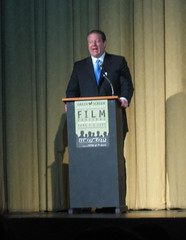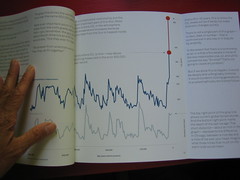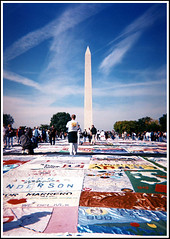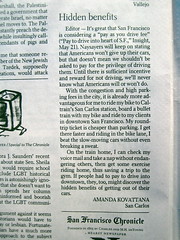An Inconvenient Truth
As I surveyed the sellout crowd for the Saturday night showing of An Inconvenient Truth, I could see familiar faces dotted through the theater. I knew they were the forerunners - teachers, research scientists, health practitioners, environmentalists, Buddhists, organic gardeners. All week I had been getting e-mails from various groups urging me to attend this all important opening weekend, make this a blockbuster so it would open at more theaters. It gave the evening the feel of a film festival.
"I hope it has a happy ending," quipped one of my seatmates.
The movie was getting a lot of buzz on news shows. It was being discovered that Gore actually had a personality and was funny even. The man, who should have been president of the free world, was, now, a man with a message and he had been delivering it the old fashion way, in person from town to town. It wasn't until he got to LA that producers approached him to make a movie. But would this be the equivalent of giving Neil Armstrong an award in cinematography for his shaky cam footage of the moon? I mean how interesting could a slide show be?
What Al Gore's movie has done is tap into the satisfying joy of going to the lecture of a favorite professor. You know the ones. They get the highest student ranking and their classes are always well attended because something happens there. Something life changing that may just determine your choices for the rest of your days, become your guiding principles. For in order to take in this information about our planet in any meaningful way, it has to reach to our core; it has to become a moral journey.
And if that doesn't speak to you, it's just a good delivery of the science brought to life with visits to the research stations in Antarctica to look at core samples and room size diagrams with giant pulsing charts and explanatory animation. "Oh so that's how the ice breaks off a Titanic size chunk at a time". Gore had persuaded the Pentagon to release information about the thickness of the ice at the North Pole. He has gathered pictures showing receding ice all over the world then and now and precipitation patterns showing extreme rain and drought. No question the world was indeed warming due to extraordinary, never before seen levels of carbon.
What you won't find in this movie is an emotional outrage, charging all over the map Michael Moore style getting everyone riled up. Or as one of my disappointed activist friends said, it won't "rip people's hearts into action". But this is not the place for passion or outrage. Passion will not stay the course. What we needed is good steady information that will make it obvious we have no recourse, but to fix this. Science is at stake here.
I never thought I'd see the day when I would have to stick up for science, but we now have a devious layer of corporate-financed, pseudo-science spread all over everything like sticky jam. So much so that when we see something clean and pure without that sticky confusing mess, we think that something is missing.
When the movie was reviewed by Ebert and Roeper, both gave it a thumbs up with Ebert absolutely earnest about how important this film was, but then there was Roeper reluctantly giving it his blessing with the caveat that there was not enough balance in the film; he did not believe that humankind was the cause of this off the chart increase of carbon, resulting in worldwide climate chaos. This was just Gore's opinion, he said. Did he miss the bit about how all the peer-reviewed scientific reports on global warming had been surveyed and of the 928, not one had questioned that human impact was the cause?
The "it's not our fault, so we don't have to do anything about it", is the latest sticky, jammy "balanced" point of view. I have to wonder about people who can watch this tremendous oncoming disaster in the making and sit back and say it's not 100% proven that it's caused by us so there's no point in cutting our carbon emissions. Are they just going to be resigned to watching the world suffer devastating hurricanes and have possibly their own home flooded by rising sea levels?
I was discussing this strange willingness to sacrifice the planet for the sake of a balanced point of view with a friend teaching a course in applied biology to designers. She told me some of her students complained that there was not enough balance in her course because she had included environmental impact as a criteria for design through the entire course. It was puzzling to us why balance even came into the picture. Was this not why they had taken a science course? To inform them of the science of their decisions? Oh, but we want that other reality. The one on TV that says its okay to trash the environment because that's what industry has done all along and it would be more balanced of you to give us the same choice. I do not think this line of thinking can last long. It is too much of a disconnect.
The beauty of Al Gore's clear presentation of the science is that it makes it obvious that we must make the connection. It appeals to our rational mind. 'But it won't stop global warming' some have declared gloomily. It is disturbing to me that so many succumb to this outlook that nothing will come of anything. It's been bad for so long, they say, why would I, now, be so embarrassingly Pollyannaish? Why should I be the one to do something when so few others will? Why should I be so inconvenienced? "It won't work, it's not enough, it's too late", they whine.
What I can offer is what I learned from another crisis on these shores, the AIDS crisis. When death walked into my community, some 25 years ago, on the proud shoulders of a leather clad gay man leading the Pride Parade, this ringside seat offered me a close look at how an educated, well heeled, first world population would handle a life threatening crisis.
Discussions took place outside the community (and inside too) about how the lifestyle of gay men had brought this on, how they deserved it and there was no cure (so just lay down and die you pervert). This was the message of my twenties and I did, for many years, embody a party-now, nihilism about life, in defiance of this sentiment.
But then, as the years wore on and a noticeable number of men were surviving AIDS, a new wisdom surfaced. I read an article about these men in the gay press and embraced the three guiding principles found to increase their rate of survival. First, they had to come out, bear up to whatever reactions people would have about queers; it was far better than internalizing the hatred. Good, I had already made this decision and no one could make me take it back. Next they had to take an active interest in living a healthy life. To me, this health-positive concept extended to my relationship with the planet as well. And third and most important, they got involved with the community efforts giving assistance to those living with AIDS and raising awareness about AIDS. So rather than distance themselves from the crisis and the community deemed to be the source of the problem, they returned to it to give of themselves.
It was this active participation that intrigued me most. For it was not deemed enough to embody an attitude that would counter despair, one also had to participate in the activism of the disease, however futile it seemed. For without a doubt, many would die, but the chance to be involved with the dying, with the mortality of the problem, helped to improve the chance that more would survive.
What translates directly from the lessons of AIDS to today's planetary crisis, is that there was no way to know then, how many people would die of AIDS and if the community would be torn apart and disappear. So when people tell me that Al Gore's movie won't stop global warming, I have to ask why do you need such certainty in order to support the movie? Just to go is to participate in a collective attempt at consciousness raising and that is in itself powerful.
There is a scene in the movie that is easy to miss, but it holds a key to the path we must take. In this scene a research scientist is pulling out an ice core. The ice cores can be dated as precisely as tree rings. He points to a brownish part, after which the ice is clean again.
"There right there, is when the U.S. passed the clean air act in 1970".
It took me a moment to realize, hey Antarctica is a long way from the U.S. yet here we can see a definite change from one point to the next that is attributed to a policy change in this one country. No wonder everyone is waiting for the U.S. to wake up. And you cannot lay the blame on China. China has emission standards for cars sold in their country that will, in two years, exceed what we are aiming for here in California for the year 2016. So are automakers gearing up to make cars for the Chinese market? Perhaps they are (secretly), but meanwhile they are suing California to keep those emission standards at the low federal levels, presumably so they can continue to sell those ever popular, planet-busting behemoths that make them more money.
Gore and Clinton had tried to persuade Congress that they had to support Kyoto. That Congress did not was of extreme frustration to Gore. These supposed leaders will not lead; these Congressmen will not act, he explained, "unless something is on the tip of the tongue of every constituent". Gore has given us, with this movie, the means to make this an issue on the tip of the tongue of every constituent.
Okay so they may not be going to see it in Podunk whatever. But enough will see it, in progressive enough spots of the country, to change policy. People motivated to write a letter to their representative, a letter to the editor, call up a radio talk show or embarrass a TV reporter into listing global warming on their top ten list of national concerns. We are not going to reduce emissions with Prius sales alone (although that will certainly send a message to automakers). This is going to have to be written into our laws. Already the list of U.S. cities that have pledged to reduce carbon emissions fills a couple of pages. They have proven, too, that it makes economic sense.
See the movie. It won't stop global warming, but it is filled with 'aha' moments and vital statistics about the state of the planet. And you may just feel less inconvenienced about doing what needs to be done even if it just means talking about it to friends or taking somebody else to see it.
also posted at energy bulletin









3 Comments:
"An Inconvenient Truth" is well worth seeing for just about anyone. It's simple and clear, not blaming, and has a surprisingly optimistic tone. I was particularly impressed that, in addition to laying out a compelling case that humans ARE the cause of global warming, it offers a selection of actions that just about anyone can take to help reduce global warming.
For example, I've known about global warming for quite a while, and thought I was doing a fairly good job of reducing my impact on the planet with my hybrid car, low thermostat settings, and virtuous avoidance of excess driving. Yet I walked out of the film having decided not to procrastinate any more about replacing my incandescent bulbs with fluorescents, and to tell everyone that they ought to go see this film.
Going beyond that, though, some of the most important steps that we can all take are (1) to stop believing that our so-called "leaders" are going to lead on this issue, that (2) the main-stream media are going to muster the courage to be honest, and that (3) it's more important to be gracious and nonconfrontational than to save our planetary home.
We The People have to lead the action on this one. Politicians and elected officials are not going to stick their necks out and risk annoying their corporate supporters or being accused of being hysterical doomsayers. Anyone with any common sense knows that there are plenty of selfish, greedy people who have a vested interest in making more money off fossil fuels (gas, oil, coal) and business-as-usual fossil-fuel-burning and inefficient technology. And common sense also tells us that a lot of these same people have been and will continue to be willing to lie about the consequences of business-as-usual, to accuse others (including timid politicians) of being scaremongers, and to intimidate the media into trying to appear "balanced" rather than telling the truth. And we also know there are a lot of people who are naive, ignorant, lazy, misguided, overly trusting, etc., who can be taken in by these tactics. Think about it--aren't these statements true?
The inconvenient--uncomfortable--truth we must confront is that we not only have to change our own energy-usage behaviors, we have to change our social behaviors. We have to speak out, write letters, make noise; tell our friends they're kidding themselves if they think that the media and the oil-industry-backed US administration are telling the truth; and tell our relatives that if they truly love us and their grandchildren, they would take their own measures to try to protect the home where we all live.
Further, we have to remind those who think that God would not let this happen--would not let the Earth be destroyed--of the saying that "God helps those who help themselves." This is perhaps the most consequential test that God could put before us--do we have the faith that we can make a difference? Are we willing to change our daily lives in modest ways in order to save Creation?
Meanwhile, back at the ranch, our dear leader thinks that the biggest threat to our world is terrorism. 10,000 people died in France because of global warming. Try to top that, Osama!!
Thanks for the beautifully written article about your visit to see Gore's movie. I am always looking forward to reading your posts. I just wish they were more frequent.
Namaste!!
I am trekking guide from Nepal if someone want to visit Nepal and to do trekking and also others activates so please contact me I help all people who fell my help.
Post a Comment
<< Home